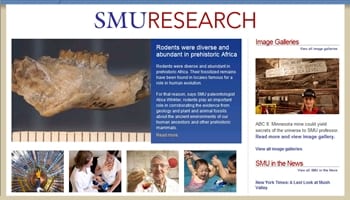The Carnegie Foundation for the Advancement of Teaching has raised SMU’s classification among institutions of higher education, reflecting dramatic growth in the University’s research activity since it was last measured in 2005.
SMU is now categorized as a research university with “high research activity,” a significant step up from its last assessment in 2005 as a doctoral/research university. The Carnegie Foundation assigns doctorate-granting institutions to categories based on a measure of research activity occurring at a particular period in time, basing these latest classifications on data from 2008-2009.
“SMU’s rise in the Carnegie classification system is further evidence of the growing quality and research productivity of our faculty. We are building a community of scholars asking and answering important research questions and making an impact on societal issues with their findings,” said SMU President R. Gerald Turner. “In addition to our dedication to outstanding teaching, SMU is becoming increasingly recognized as a vital resource for research in a variety of fields.”
Increased research activity in step with other SMU advances
“The designation of SMU as a ‘high research activity’ university by the Carnegie Foundation is an important step in SMU’s evolution as a strong national university,” said Paul Ludden, provost and vice president for academic affairs. “The faculty, staff, and students at SMU can be proud of this, particularly when paired with our rise in national rankings. The Carnegie Classification recognizes the tremendous efforts by the entire faculty at SMU to expand our research portfolio and address the many questions facing North Texas and the world. Recognition should go to Associate Vice President for Research James Quick and his office for their efforts to support the research activities of our faculty and staff.”
The foundation’s assessment of SMU’s increased research activity occurs as the University is making dramatic advances in other measures of academic progress: U.S. News and World Report magazine gave SMU its highest ranking ever for 2011, placing SMU 56th among 260 “best national universities” — up from 68th in 2010.
Additionally, SMU’s Cox School of Business is one of only a few schools in the nation to have all three of its MBA programs ranked among the top 15, according to Bloomberg Businessweek. Applications to SMU continue to rise, as have average SAT scores for admitted students.
Carnegie finds SMU research activity recorded an increase
The Carnegie Foundation analyzed SMU’s research activity in a category of universities that awarded at least 20 research doctorates in 2008-2009, excluding professional degrees such as those leading to the practice of medicine and law. The analysis examined research and development expenditures in science and engineering as well as in non-science and non-engineering fields; science and engineering research staff (postdoctoral appointees and other non-faculty research staff with doctorates); doctoral conferrals in the humanities, in the social sciences, in STEM (science, technology, engineering, and mathematics) fields, and in other areas such as, business, education, public policy and social work.
The Carnegie Foundation classification of U.S. accredited colleges and universities uses nationally available data from the U.S. Office of Postsecondary Education, the National Center for Education Statistics’ Integrated Postsecondary Education Data System (IPEDS), the National Science Foundation, and the College Board.
“SMU’s rise in academic rankings and research productivity is a strong return on the investment of our alumni and other donors who provide support for research, endowed chairs, and graduate programs and fellowships,” said SMU Board of Trustees Chair Caren Prothro. “SMU students at all levels are the beneficiaries of this distinction as their faculty enliven the classroom with their research and engage students in the tradition of academic inquiry.”
About the Carnegie Foundation for the Advancement of Teaching
Founded by industrialist Andrew Carnegie in 1905 and chartered the following year by an Act of Congress, the Carnegie Foundation for the Advancement of Teaching is an independent policy and research center. Its current mission is to support needed transformations in American education. — Kim Cobb
 The
The 





